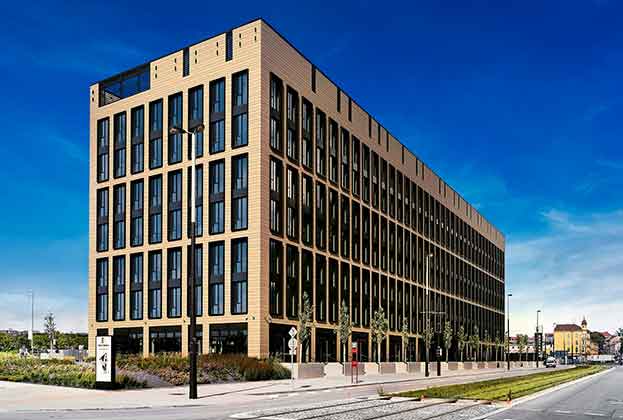What next for the flexible office market?
2019 has so far been another boom year for flexible offices across Europe as at Q3 2019, 687,000 sq m of space has been signed for by flexible office operators, 15% above the equivalent level in Q1–Q3 2018. New, niche operators are entering the market, reducing the operating profit margins on offers for the more established players as landlords weigh up opportunities to launch their own co-working space to increase income streams. As a result, flex space is increasing its market share. In 2018, flexible office take-up accounted for 10.2% of Europe’s office take-up, which has risen to 12% of total take-up in Q1–Q3 2019 (see below).
Softbank’s recent $9.5bn WeWork rescue package will increase its stake in the business to 80% and will provide liquidity to pay lease commitments over the next two years as rent-free periods expire. Softbank reported to the FT that they would shed as many as 4,000 jobs in WeWork – a third of the global workforce in order to reduce costs as they also seek to lift occupancy levels to 90% – currently it is under 80%. However, IWG, whose brand names include Regus and Spaces, reported 9% revenue growth during Q3 2019, as sale and franchise transactions have spread risk and help to pay off existing debt. Although there remains a level of opacity in occupancy data in flex operators, we should remember that in London, flexible space accounts for less than around 5% of total stock and accounts for around of c.1% of total stock across the rest of Europe’s key cities, so any large scale shocks to the sector is unlikely to have any real impact on vacancy rates.
One thing for certain is that demand for flexible lease terms is on the rise, propped up by a polarisation of a) business uncertainty and b) strong business growth, as tenants now have an alternative to being locked into institutional leases.
The other contributor in play to the growth of flexible office space is technology, allowing employees to work more remotely. Savills What Workers Want data indicates that on average, Europe’s workers spend approximately 66% of their working time at their desk. This has driven landlords to ensure their space works harder for the end-user, with more breakout areas services on offer, similar to what we see in the hotel sector.
Jess Alderson, Workthere, examines the growth in demand for flexible space across Europe’s gateway cities
Across Europe, the average number of desks required within a flexible workspace increased by 7% in the first nine months of the year to 12.5 desks as the landscape further shifted from individual freelancers looking for coworking memberships to dedicated private offices for companies. In addition, the average term length increased to 11.6 months from 10.9 months last year. A key trend that is supporting the rise in desk number requirements and term lengths is the increasing use of flexible offices by large corporates.
Earlier this year, HSBC took over 1,000 desks in a WeWork in Waterloo. Other large corporates that are using flexible offices in some way include Apple, BP, Facebook, Samsung, Alibaba, Samsung, Goldman Sachs, Microsoft and GlaxoSmithKline. In addition, flexible office providers are leasing increasingly bigger spaces, with the average space leased in the UK nearly doubling to 30,500 square feet this year up from 15,600 square feet in 2013. Consequently, flexible offices are now able to accommodate larger desk number requirements, such as those for 100 desks or more.
London continues to see the highest desk prices in Europe for private offices within flexible workspaces, with an average of £700 (€819) per desk per month, brought up by areas such as Mayfair and the City (see below). Average monthly desk prices in other European capitals are €700 in Paris, €650 in Berlin, €600 in Dublin, €500 in Amsterdam and €430 in Madrid. The average rental discount for membership agreements arranged by brokers increased from 7.8% last year to 9.2% this year, implying a shift in negotiating power away from flexible office providers.
The biggest differentials between the capital and regional city desk prices are in France and the UK. In France, the €700 monthly desk prices in Paris are roughly double that of Lyon, Marseille and Nice. In the UK, the £700 monthly desk prices in London are also approximately double that of the regional cities such as Manchester, Birmingham, Leeds and Reading. There is also a noticeable differential in The Netherlands, with the average desk prices in Amsterdam being 54–67% higher than The Hague, Eindhoven, Rotterdam and Utrecht. Germany, Ireland and Spain have slightly more homogenous prices between the major cities, with differentials of broadly 20– 30%.
This year saw an increasing number of UK businesses exploring the Dutch, German and Irish markets to assess if these could be viable alternative options for their headquarters in light of Brexit. Overall in Europe, this year is seeing significantly more companies moving into flexible offices due to new businesses being set up, which ties in with a record year for European venture capital investment. We also saw a significant increase in the proportion of enquiries about flexible offices due to people being dissatisfied with their current workspace.
Read the articles within European Offices Outlook below.
.jpg)




